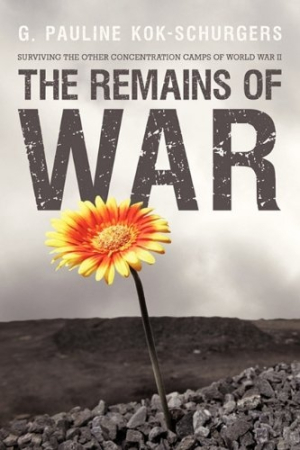The Remains of War
Surviving the Other Concentration Camps of World War II
Traces of despair mingle with whimsical childhood reflections, alluding to a young girl’s impending push into premature adulthood in this story of wartime.
Concentration camp survivor G. Pauline Kok-Schurgers’s debut is a memoir that recalls WWII from the less familiar perspective of a Dutch child living through the Japanese takeover of Indonesia. Graphic, meditative, and revealing, The Remains of War is a must read for all who wish to understand the costs of war in full.
At nine, Kok-Schurgers, called Sofia, is vaguely aware that her happy island life has been compromised by the encroaching war. Dives for bomb shelters have become a feature of carefree bike rides, and her kindly father was picked up by a Japanese transport days ago. Traces of despair mingle with whimsical childhood reflections, punctuating tensions well and alluding to Sofia’s impending push into premature adulthood.
Still, nothing seems quite real until she and all of the other Dutch residents of the island are told to pack their bags and report to a hotel. Once there, a barbed-wire fence is erected around them, and life begins to change rapidly. Kok-Schurgers illustrates the ways in which forced routines begin to fray prisoner nerves, particularly as she is slowly made to let go of childhood attachments. Danger becomes palpable as her future hazes.
Sofia and her family are ferried from camp to camp, each worse than the last. Friends disappear, starvation and disease claim many, and the Japanese guards become increasingly more sadistic.
Characters are drawn with sensitivity and insight, even where they are flawed. Sofia’s mother becomes psychologically fragile, snapping back to full reality only to saddle Sofia with her neuroses. Sofia must take on the task of caring for her brother and younger sisters, though she herself is still so young. Sofia turns to a fellow resident, Mies, for maternal comfort. In Kok-Schurgers’s capable hands, Mies becomes a quiet heroine, persisting with dignity, maintaining faith with gentle forcefulness, and encouraging complicated questions of good and evil.
Kok-Schurgers tells her story with beautiful sensitivity. Pages are laden with empathy and introspection: Sofia struggles to understand her mother’s condition and coldness, even as her behavior takes on a cruel edge that costs Sofia greatly. She watches those she loves suffer, and grapples with maintaining both a protective distance and her own sense of compassion. At its heart, the book illustrates how difficult it is to preserve one’s humanity underneath conditions designed to break it. Readers will easily draw parallels to works like Elie Wiesel’s Night and Primo Levi’s Survival in Auschwitz.
Skillful turns of phrase propel the story and ensure reader engagement. Of the changes forced upon her, Kok-Schurgers says, “behind my closed eyes, the bright, beautiful colors of freedom and happiness changed into drab, dark shades of fear, insecurity, and void.” Such moments are a powerful reflection of the effects of war on children in particular. Juxtaposed images of cherished baubles with protruding bones and distended stomachs further encapsulate such conditions.
Kok-Schurgers elects to end her narration with the liberation of the camps, which may leave readers wondering how family troubles are resolved. The Remains of War is a sensitive, illuminating, and important text.
Reviewed by
Michelle Anne Schingler
Disclosure: This article is not an endorsement, but a review. The publisher of this book provided free copies of the book and paid a small fee to have their book reviewed by a professional reviewer. Foreword Reviews and Clarion Reviews make no guarantee that the publisher will receive a positive review. Foreword Magazine, Inc. is disclosing this in accordance with the Federal Trade Commission’s 16 CFR, Part 255.

